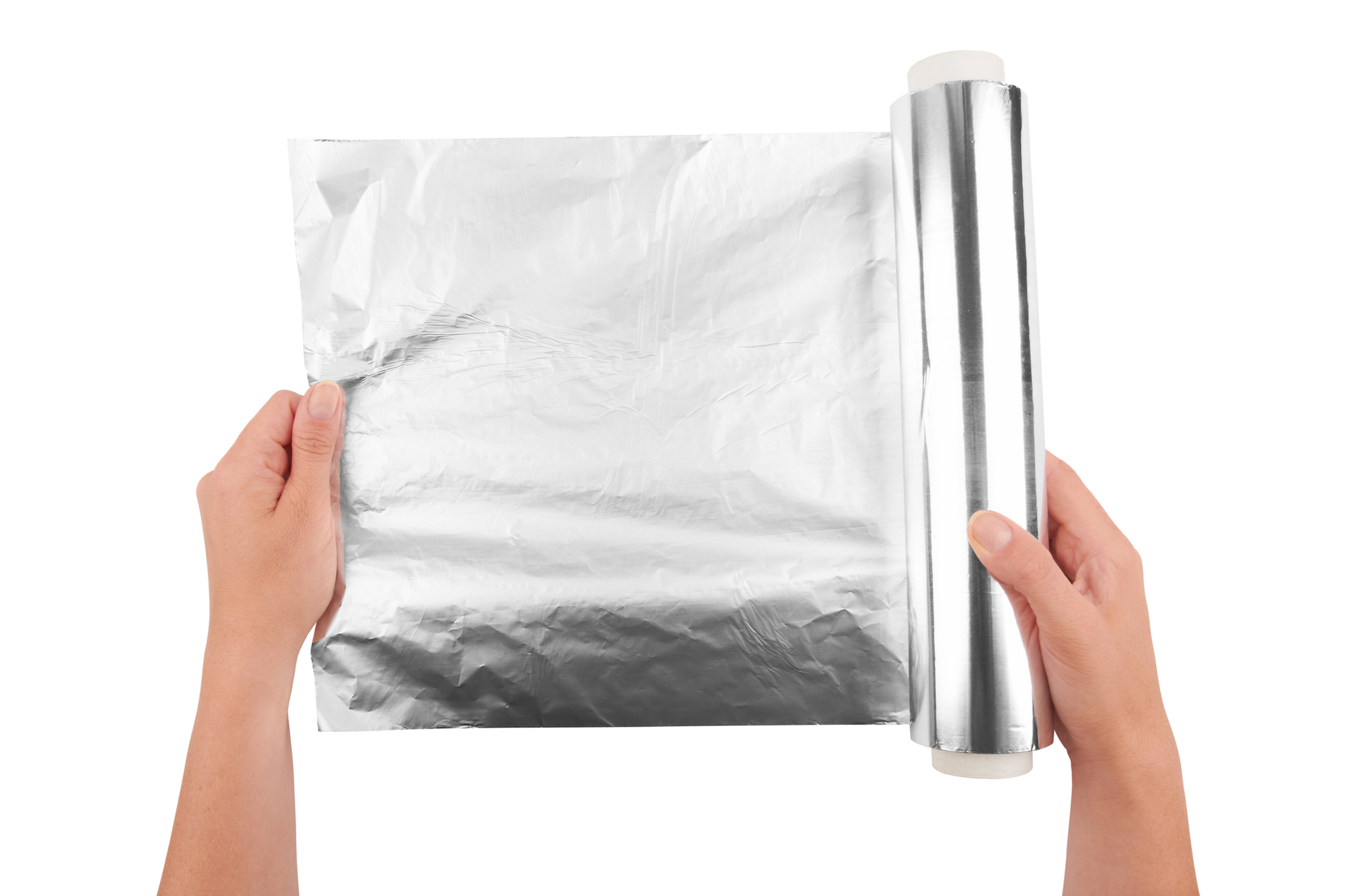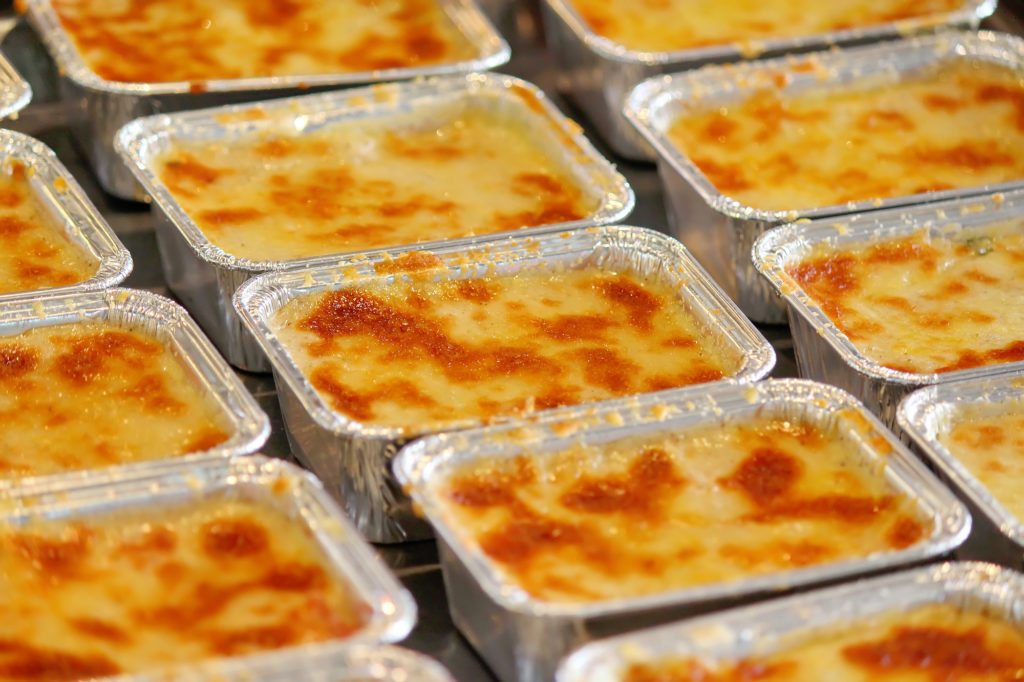
Inside This Post: How dangerous is aluminum & aluminum foil to your health? Reducing your use of aluminum suing and safe cooking and food storage options without aluminum.
Is Aluminum Safe to Use?
The other day I stopped abruptly while looking through my Instagram feed. The picture that made me cringe? Someone had just finished making bulk meals and were storing them in aluminum baking trays for the freezer, and then wrapping steamed vegetables in aluminum foil to add to meals for the week.
The concept is genius and super smart when you have kids and a busy week ahead, but the part that made my stomach twist was the use of aluminum and aluminum foil to do this.
Have you heard about the potential health dangers of using aluminum for such things as this?
Aluminum foil is easily available in almost every baking aisle, from lining sheet pans, packets for the grill, wrapping veggies for cooking in the oven and storage in the fridge, these are just a few uses of aluminum foil people use in the kitchen every day.
But, can cooking and storing food in foil have dangerous consequences?
What is Aluminum
Aluminum is the most abundant metal in the earth’s crust and cannot be destroyed in the environment, it can only change its form.
In its natural state, it is bound to other elements like phosphate and sulfate in soil, rocks and clay and small amounts of aluminum can be found dissolved in water such as streams, lakes, and rivers from these natural occurrences.
However, it’s also found in small amounts in the air, water and in your food.
Aluminum compounds have many different uses, for example, as alums in water-treatment and alumina in abrasives and furnace linings. They are also found in consumer products such as antacids, astringents, buffered aspirin, food additives, cosmetics, and antiperspirants.
Aluminum is often used in cooking and household items but there are two kinds of aluminum we’re talking about here. The food grade version of aluminum is safe, the non-food grade version, isn’t.
Food grade aluminum are your pots, pans and cooking sheets.
Non-food grade aluminum is your aluminum foil, disposable baking trays, and foil packets.
Cooking with aluminum pots and pans isn’t a bad thing, but when you place hot food or cook food in aluminum at high temperatures, that’s where the problem lies.

Aluminum a Part of Your Daily Diet?
According to the Center of Disease Control (CDC), the average adult in the US ingests about 7-9 mg of aluminum per day via their food.
Whole foods like meat, vegetables and fruits may naturally contain small amounts of this metal since it is a naturally occurring element.
Other aluminum compounds however can be added to foods and processed foods in the form of baking powder, preservatives, coloring agents, anti caking agents, and thickeners to increase your digestion of aluminum.
Humans can also be exposed to aluminum in the air they breathe from dust collection and absorption through the skin. However, very small amounts of what we ingest, inhale, or absorb through skin will enter the bloodstream but aluminum cannot be destroyed once it’s there, it can only accumulate.
Toxicity & Health Concerts of Aluminum
The CDC has not done any testing on the dangerous of aluminum to adults, although it is a known neurotoxin.
What we do know is that through the body’s natural detoxification of secreting aluminum through feces and urine, if it accumulates in the organism, it has the potential to damage the nervous system, kidneys and bones.
Here are some more research studies and their findings on aluminum toxicity.
Male Infertility
A recent study found a correlation between aluminum and male infertility. After analyzing sperm samples from more than 60 participants, the researchers confirmed that their semen did contain aluminum. The more aluminum the sample contained the lower the sperm count was.
Alzheimer’s Disease
Dietary aluminum has been suggested as a potential factor in the development of Alzheimer’s disease.
Alzheimer’s disease is a neurological condition caused by a loss of brain cells. People with the condition experience memory loss and a reduction in brain function. High levels of aluminum have been found in the brains of people with Alzheimer’s.
The cause of Alzheimer’s is unknown, it is thought to be due to a combination of genetic and environmental factors, which can damage the brain over time.
Irritable Bowl Disease
In addition to its potential role in brain disease, a handful of studies have suggested that dietary aluminum could be an environmental risk factor for inflammatory bowel disease (IBD).
What the CDC has done is test aluminum on children and this is what they found:
-
Children with kidney problems who were given aluminum in their medical treatments developed bone diseases. It does not appear that children are more sensitive to aluminum than adults.
-
We do not know if aluminum will cause birth defects in people. Birth defects have not been seen in animals. Aluminum in large amounts has been shown to be harmful to unborn and developing animals because it can cause delays in skeletal and neurological development.
-
Aluminum is found in breast milk, but only a small amount of this aluminum will enter the infant’s body through breastfeeding.
While research studies are limited, and more needs to be conducted to fully understand how this metal damages the human body, it is best to avoid cooking with aluminum and aluminum foil products.
High Temperatures Affect Aluminum Being Absorbed Into Food
Researchers have found that cooking in aluminum foil is not safe because the food comes into direct contact with the metal.
Since the majority of aluminum intake comes from food, it’s important to be cautious with how you prepare and store food using, aluminum foil (if at all.)
Since aluminum foil and baking sheets are not food-grade materials, this means the metal when exposed to heat and high temperature, can leach aluminum into your food.
Studies show that aluminum foil, cooking utensils and containers can leach aluminum into your food.
When aluminum leaches into your food, what this means is that the concentration of aluminum in food increases and may surpass the recommended limit (no more than 40 mg per kilogram of body weight a day) for adults.
This means, if you cook and store food using aluminum foil or similar products, you likely will increase the amount of aluminum accumulating in your body. The amount of aluminum that passes into your food when cooking with aluminum foil is affected by a number of things, such as:
- Temperature: Cooking at higher temperatures
- Foods: Cooking with acidic foods, such as tomatoes, red meat, lemon / lemon juice, and cabbage
- Certain ingredients: Leaching levels climb even more when salt and spice is added to food that’s cooked in aluminum foil.
One study found that cooking red meat in aluminum foil could increase its aluminum content by between 89% and 378%.
If the aluminum isn’t eliminated by the body’s natural detoxification process via the kidneys, it will store in the bones, lungs, muscle, liver and brain. According to the World Health Organization, the percentage of aluminum body burden is in the bone (60%), lung (25%), muscle (10%), liver (3%) and brain (1%), respectively.
Some foods, such as tea leaves, mushrooms, spinach and radishes, are also more likely to absorb and accumulate aluminum than other foods (source)
Avoiding Aluminum Exposure to Food
Aluminum is present in many other kitchen products like foil, canned goods, water bottles, drink pouches, and tin storage dishes.
Research shows that it transfers into food, especially when foods are heated in foil or containers or come into contact with it while hot. More recent research even shows that room temperature can cause aluminum to leach into food! Yikes.
I prefer to avoid aluminum foil for coking and storing foods, no matter if they’re hot or cold.
Here is how you can avoid using aluminum in your kitchen and cooking and some easy substitutes:
- Avoid high-heat cooking: Cook your foods at lower temperatures when possible.
- Stop cooking with aluminum foil: Stop your use of aluminum foil for cooking, especially if cooking with acidic foods, like tomatoes, meat or lemons. Avoid lining trays to cook or roast in the oven, just use a safe pans and lightly coat with oil if you need.
- Use non-aluminum utensils: Use non-aluminum utensils to cook your food, such as glass cookware, porcelain dishes and silicon or wooden utensils.
- Avoid mixing aluminum foil and acidic foods: Avoid exposing aluminum foil or cookware to acidic food, such as tomato sauce, meat, cheese, lemon juice and rhubarb.
- Save Food in Non-Toxic Containers: I love these silicon storage bags, but also use parchment paper, land beeswax wraps that are amazing and reusable for up to a year! We also have a stack of glass pyrex storage containers with BPA free lids.
- Lunchbox Leftovers and Food: I pack lunches with lunchskins paper sandwich and snack bags for my kid’s lunches. No plastic wrap, no aluminum foil ever!
- Stock up on Mason Jars: I have a collection of small to large mason jars that work great for storing leftovers and food in the fridge and freezer.
- Avoid drinking canned drinks like soda and even Le Croix
- Use a reusable stainless steel water bottle that doesn’t contain aluminum or plastic. I carry around a 32oz Simple Modern Stainless Steel Water Bottle all day long and if you have kids, here’s also a list of safe drinking products just for them.
- Be Careful When Eating Out. While I love Chipotle and think they do a good job sourcing ingredients from safer sources than say, Fast Food chains, I hate that they wrap a hot burrito in aluminum foil. Be wary of where you eat out and ask to dine in or alternative wrapping if it’s available instead of aluminum trays, foil and take-out materials.
More Household Items with Aluminum to Avoid
Aluminum is certainly a controversial substance and one that hasn’t been studied extensively on the effects on human health and long-term human toxicity. At the same time, avoiding it won’t cause any harm and there are many substitutions that are non-toxic and safe to use in it’s place, so I personally avoid it as much as possible.
If you too want to avoid aluminum, watch out for aluminum in these consumer products:
- Antacids – Antacids contain 300-600 mg aluminum hydroxide, which translates to 104-208 mg of aluminum per tablet, capsule or 5mL liquid dose. While little of it will be absorbed it may be a concern for those already experiencing high exposures of the metal or those wishing to avoid it completely.
- Antiperspirants – Aluminum zirconium tetrachlorohydrex glycine is the form of aluminum used in antiperspirants. Look for a safe deodorant without aluminum like Truly’s Natural Deodorant.(it doesn’t have any baking soda either.) Beware of natural deodorants like crystal which can still contain aluminum.
- Buffered Aspirin – One tablet of buffered aspirin may contain 10-20 mg of aluminum. (source)
- Sunscreen – Many sunscreens, and also moisturizers and cosmetic foundations with sunscreen. use aluminum hydroxide as an opacifying agent, skin protectant, and cosmetic colorant. I like to use a zinc oxide and titanium based sunscreen like thinkbaby safe sunscreen.
The Comments
Tina Harr
Thank you for the info.
Karen
You might also want to avoid vaccines, since the aluminum adjuvant is a known cause of autism in children, and contributes to neurologicql damage in adults. In the 1970s, autism rates were one in 15,000. Now they’re one in 32. This is largely due to an enormous increase in childhood vaccinations over the last 50 years.
Corinne
KarenYes, couldn’t agree more.
James Bukovec
Something to consider for sure. Thanks for the info. James from Ohio
Meldy
Thanks for laying out the information about aluminum pans. I always use disposable aluminum pans but I always line it or layer it with parchment paper. Is that sufficient to be protected from toxicity of aluminum? Thanks.
Corinne
Meldyyes, lining with parchment paper is a great way to utilize this when cooking.
Mariane
Hi! Curious about this situation. I am on the same boat,
I avoid it completely, period.
I went to eat out and ordered some lemon ricotta pancakes and they started to pack on the foil tray. The moment they placed it I asked to remove it and place it on paper. Do you believe that exposure was enough to leach it? It was probably a minute or less.
Corinne
MarianeHi Mariane,
There are always going to be times when you can’t avoid contact with some type of toxin or chemical. We live in a toxic world, and that’s just the truth. For situations like this, I have several different binders from Cellcore on hand, exactly for this reason (they’re the most effective binders at sweeping up toxins in the body with their humic & fulvic carbon technology without depleting minerals from the body, and can cross the blood-brain barrier unlike activated charcoal or a synthetic zeolite blend.) Biotoxin Binder is their catch-all binder, but they have a Heavy Metal & Environmental Toxin Binder (HMET) and Virus/Radiatation/Chemical Binder (ViRadChem) that can bind to specific substances in the body and help sweep them out. Before you use any binder though, make sure your detox pathways are open (pooping, sweating every day) or the toxins will recirculate. You can check out the Cellcore Binders here (use my Practitioner Code qC6Qxhdj). Let me know if you have any questions!
Lucy
Hi
I’ve been looking at the beautiful vintage Citrus juicers on eBay and have found out the part that filters the juice from the pith is made of aluminium. Would you avoid this?
Thanks
Corinne
LucyI don’t worry as much about appliances because they aren’t made with food grade aluminum (like aluminum foil). I do try to look for stainless steel or glass when buying appliances like air fryers, juicers, toaster ovens, etc. as that’s generally a better option. But for a juicer, and since you aren’t exposing the citrus to high heats, there is minimal you should worry about.
Bev
If you had vegetable oil for cooking French fries in an aluminum pot for a period of time would the oil be ok to use again?
Corinne
BevWell… with vegetable oil and the inflammation it causes to the body (possibly carcinogenic), I would recommend not eating it at all.
John Mullins
Great article. This article is full of information & knowledge. Many thanks to the author for clearly highlighting the harmful aspects of aluminum usage. We really need to think again about how much harm we are doing to ourselves every day by using Aluminum.
Sue
Would you worry too much about aluminum pieces inside an air fryer, as long as they don’t touch the food? It’s hard to find completely aluminum free ones.
Corinne
SueI wouldn’t worry about it. We can’t ever completely live in a tox-free world and if we do our best 75% of the time, I think that’s great!
Maria
Hello,
I just came across your article and I have been on my computer for more than two hours trying to find out if a “counter oven”, made with aluminum walls that will not touch the food are safe.
There is no info on that. I wander if it releases some particles that will end up in the food?
I plan to use it for baking and ocasionally for a poultry or fish dish.
Corinne
MariaMetal made in appliances is a different grade than that used in aluminum foil. I wouldn’t worry about it 🙂